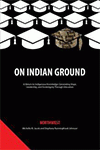
On Indian Ground
The Northwest
Edited by:
Michelle M. Jacob, University of Oregon
Stephany RunningHawk Johnson, University of Oregon
A volume in the series: On Indian Ground: A Return to Indigenous Knowledge-Generating Hope, Leadership and Sovereignty through Education. Editor(s): Joely Proudfit, California State University San Marcos . Linda Sue Warner, Northeastern A & M College.
Published 2019
On Indian Ground: Northwest is the second of ten regionally focused texts that explores American Indian/Alaska Native/Native Hawaiian education in depth. The text is designed to be used by educators of Native youth and emphasizes best practices found throughout the region. Previous texts on American Indian education make wide-ranging general assumptions that all American Indians are alike. This series promotes specific interventions and relies on Native ways of knowing to highlight place-based educational practices.
On Indian Ground: Northwest looks at the history of Indian education across the Pacific Northwest region. Authors also analyze education policy and Tribal education departments to highlight early childhood education, gifted and talented educational practice, parental involvement, language revitalization, counseling, and research. These chapters expose cross-cutting themes of sustainability, historical bias, economic development, health and wellness and cultural competence.
CONTENTS
Foreword. Preface: On Indian Ground: A Return to Indigenous Knowledge. Introduction, Stephany RunningHawk Johnson, Edward Arlen Washines “Shx’my’ah,” and Michelle M. Jacob. Indian Education in the Northwest, Tary Jeanne Tobin. American Indian Education in Idaho: Dismantling the Deficit Model and Honoring Resilience, Lindsey Schneider. Rethinking Oregon Indian Education: Native American Studies Transforming Teacher Education, Brook Colley and Roni Adams. A Practical Approach to Improving Transition Services for American Indian Students, Hobie Blackhorn. Transforming Teaching and Learning Through Indigenous Strengths and Ways of Knowing, Anthony B. Craig. Pursuing Indigenous Education on Indigenous Terms: Portraits of Indigenous Education in Practice, Leilani Sabzalian, Dawn Malliett, and Enna Helms. K–12 Best Practices: The Effect of Graphic Organizers on Native American Students’ Learning and Retention in Algebra, Elese Adele Washines. Indigenous Environmental Science on the Columbia River Plateau: Traditional Ecological Knowledge and the People of the Big River Field Class, Jessica L. Black and Michelle M. Jacob. Native College Student STEM Experiences: Assessing a Mentored Research Approach, Carol Ward, Janie Demetropoulos, Hannah Horan, Meagan Rainock, Liberty Tatham, and Jake Wixom. The Fruit of Protest and Listening to Indigenous Voices: The Continuing History of the University of Oregon Sapsik’wała Teacher Education Program, Jerry Lee Rosiek and Jimmy Snyder. Supporting Community Goals for Indigenous Language Revitalization in the Language Education Classroom, Regan Anderson. Language Revitalization and Vitality: Schools and Communities Working Together, Joana Jansen, Valerie Switzler, and Janne Underriner. About the Editors.
-
Paperback978-1-64113-900-7
Web price: $45.04 (Reg. 52.99)
-
Hardcover978-1-64113-901-4
Web price: $80.74 (Reg. 94.99)
- eBook978-1-64113-902-1

- SOC021000 - SOCIAL SCIENCE: ETHNIC STUDIES: Native American Studies
- EDU016000 - EDUCATION: History
- EDU007000 - EDUCATION: Curricula
-
 American Educational History Journal - Golden Anniversary Edition
Volume 50 Numbers 1 & 2
American Educational History Journal - Golden Anniversary Edition
Volume 50 Numbers 1 & 2
-
 Frameworks for Integrated Project-Based Instruction in STEM Disciplines
Frameworks for Integrated Project-Based Instruction in STEM Disciplines
-
 History Education and Historical Inquiry
History Education and Historical Inquiry
-
 On Indian Ground
The Southwest
On Indian Ground
The Southwest
-
 On Indian Ground
Northern Plains
On Indian Ground
Northern Plains
-
 On Indian Ground
California
On Indian Ground
California
-
 Reflections on People, Policy, and Practices in Curriculum History
Reflections on People, Policy, and Practices in Curriculum History

